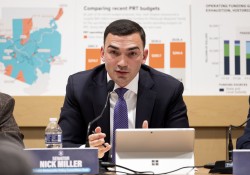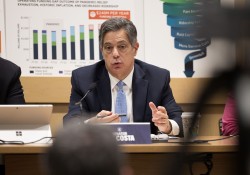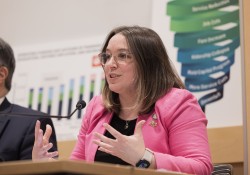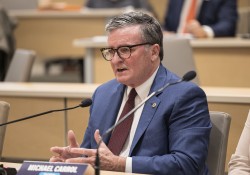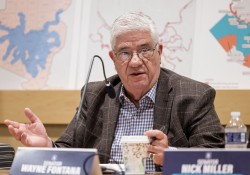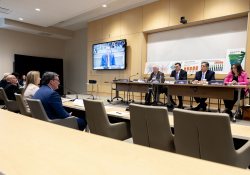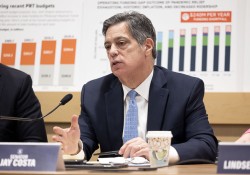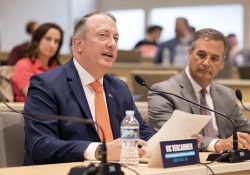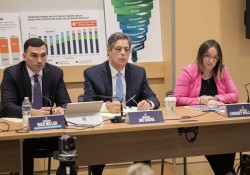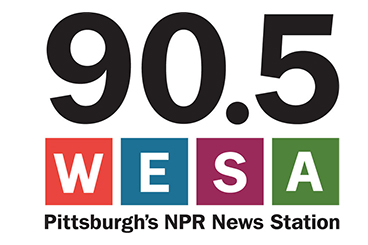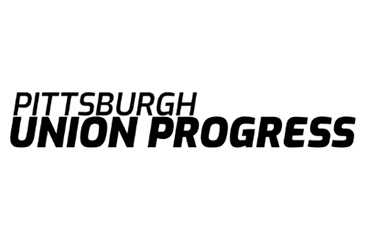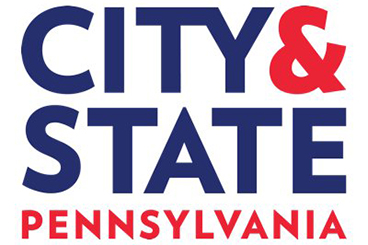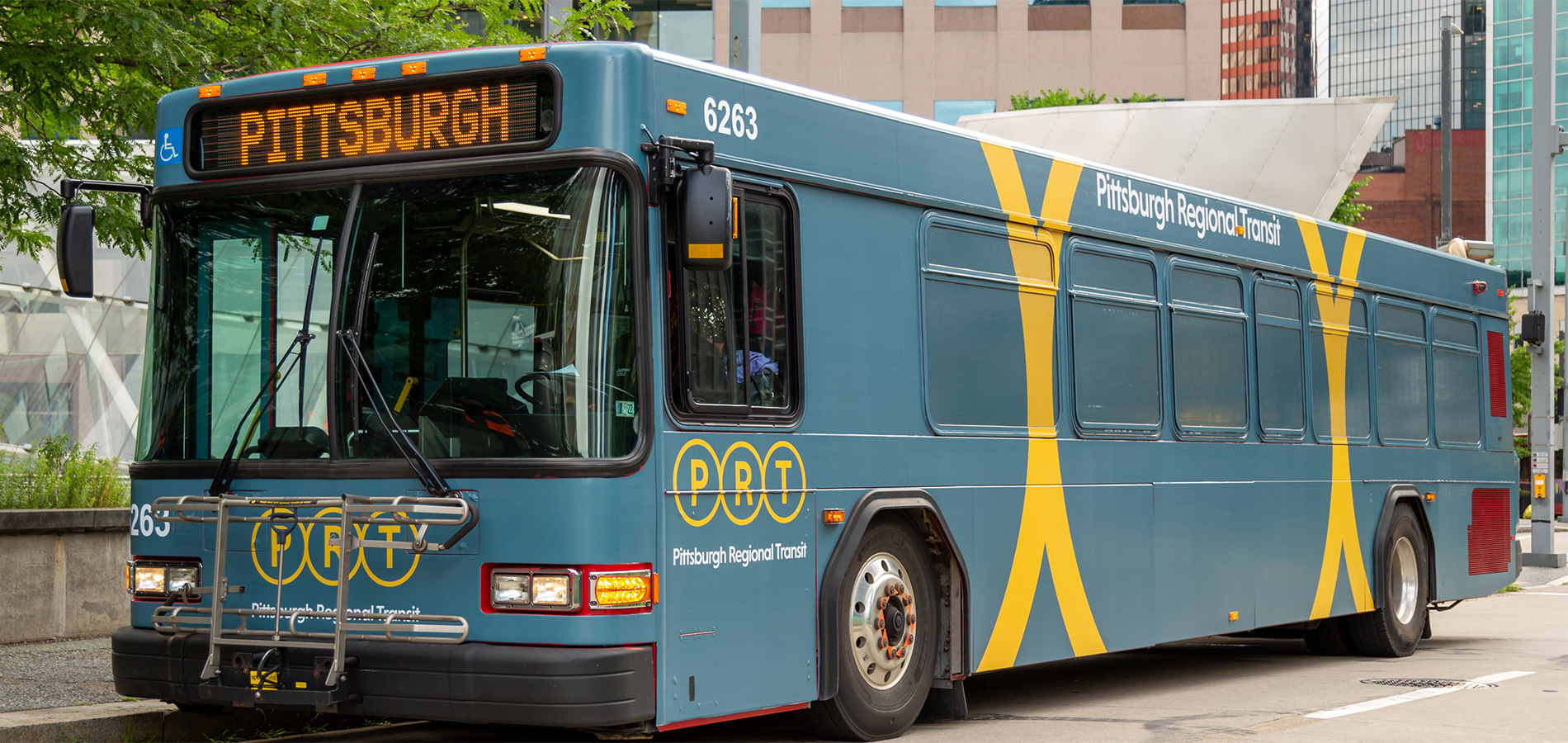
SWEPTA
Southwestern Pennsylvania Regional Transit Agency
It is time to right-size our regional transportation system to meet the regional economy of the Southwestern part of the Commonwealth. This legislation would encourage smaller transit agencies to consolidate with PRT to create SWEPTA, a regional transit authority with a larger board and multi-county representation.
CBS News – April 29, 2025
State Senator Working on Legislation to Create Transit Authority in Southwestern Pennsylvania
State Senator Jay Costa is trying to slow down or halt public transit inefficiencies in southwestern Pennsylvania.
Senate Democratic Caucus Hosts Hearing Regarding the Future of Mass Transit
PITTSBURGH, PA − April 15, 2025 − Today, Senate Democratic Policy Committee Chair Nick Miller held a hearing to examine the needs of regional mass transit systems and assess ways to ensure that their benefits remain accessible to residents and local businesses in Pennsylvania.
“Across our Commonwealth, we have noticed a rising mass transit funding crisis characterized by substantial cuts in services due to budget limitations. Consequently, we are jeopardizing the daily lives of our residents who depend on public transportation to get to work, visit friends and loved ones, and traverse these regions for everyday needs,” said Senator Miller. “Though today’s hearing focused on Pittsburgh and Allegheny County, we are seeing reduction in access to transit in every corner of the commonwealth, including rural and suburban areas. In my district, Lehigh and Northampton Transportation Authority (LANTA) has also been impacted by this crisis and recently reduced services. Today’s hearing highlights the importance of collaboration to identify a solution that ensures our mass transit systems remain accessible to all residents, regardless of age or ability.”
“Today’s hearing was a critical step in understanding the work before us in delivering excellent public transit for every Pennsylvanian, and I am grateful for all the testifiers who shared their knowledge and expertise with us,” said Senator Costa. “Public transit is critical infrastructure for our students, our seniors, our workers, our tourists, our disabled friends and neighbors, our parents, and our climate. While providing essential services to riders, public transit also fuels our region’s economy by connecting workers to workplaces, improving access to family sustaining jobs and providing workforce needs for employers. I look forward to making progress in this critical space together as we move forward.”
“Public transportation is an essential asset to communities across the commonwealth, including here in Western Pennsylvania where transit authorities serve residents, businesses, and visitors,” said Senator Fontana. “It is incumbent upon us to ensure long-term sustainability of our transit systems so that we not again facing drastic cuts to the services so many our constituents depend upon.”
“As a new member of the PRT board and the State Senator representing the region of Allegheny County with the most service cuts since 2013, I am committed to finding a long-term funding solution for our public transit system to not only keep it alive, but for it to thrive,” said Senator Lindsey Williams. “Our people, our workforce, and the future economic prosperity of Pennsylvania depends on access to transportation. I’m grateful to today’s testifiers, who represented the senior and disabled communities and our region’s largest employers and clearly communicated the dire need for a funded system of public transportation.”
“We need to think boldly about the future of transportation in Allegheny County and across Pennsylvania,” said Senator Pisciottano. “We are actively working with state and local leaders to explore solutions that address the current funding gaps and prevent harmful service cuts, including advocating for sustainable, long-term investments in public transit to support riders and ensure equitable service. By making smart investments today, we can build a transit system that serves our communities for generations to come.”
Katharine Kellman, CEO of Pittsburgh Regional Transit, stated the importance of finding a funding solution that will avoid service disruptions and economic setbacks.
“If we don’t come together and identify a lasting solution, the fiscal cliff transit agencies across Pennsylvania face ultimately will make it harder to support economic opportunities, attract and retain employees, and support the social and business needs of our Commonwealth,” said Katharine Kellman. “Transit is not and should not be an optional priority—it is a foundational one.”
Michael Carroll, Secretary of Pennsylvania Department of Transportation (PennDOT), highlighted their commitment to strengthening the public transportation system through continued collaboration, innovation, and strategic investments.
“Across Pennsylvania, 53 public transit agencies deliver millions of trips every year—supporting mobility in every one of our 67 counties. In rural areas, small towns, and cities like Pittsburgh, transit is a daily necessity,” said Michael Carroll. “In fact, outside the Philadelphia and Pittsburgh regions, over 45,000 trips occur every day, keeping tens of thousands of cars off our roads and reducing congestion and emissions.”
Kendra Ross, Head of Social Impact at Duolingo, expressed concerns amongst the growing workforce in Pittsburgh.
“We’re fortunate to be well-served by PRT today and we hope that that can continue. The proposed service cuts will directly impact us as well as many other businesses in our community, with several lines in East Liberty set to be cut or significantly scaled back,” said Kendra Ross. “It’s been a topic of significant concern among our workforce; I have heard from many of our employees, worried about what this will mean for their commute.”
Lauren Poskin, the Executive Director of Age-Friendly Greater Pittsburgh, emphasized the need to invest in public transit for the community’s well-being, economy, and quality of life.
“Transportation avoids institutionalization, which is both extremely costly and not what people want,” said Lauren Poskin. “People want to age in community. Both from the human and fiscal perspectives, this is an investment we can’t afford not to make.”
The panelists for today’s hearing included:
- Michael Carroll, Secretary, Pennsylvania Department of Transportation
- Donminika Brown, Chief Financial Officer, Pittsburgh Regional Transit
- Katherine Kelleman, CEO, Pittsburgh Regional Transit
- Ross Nicotero, President Business Manager, A.T.U. Local 85
- Dan Yablonsky, Digital Organizing Director, Pittsburghers for Public Transit
- Laura Poskin, Executive Director, Age-Friendly Greater Pittsburgh
- Kendra Ross, Head of Social Impact, Duolingo
- Vic Vercammen, Vice President, Safety, Regulatory & Government Affairs, Giant Eagle, Inc
- Dr. Mark Rubino, President, Allegheny Health Network Forbes and Allegheny Valley Hospitals
Senator Nick Miller was elected Policy Chair of the Senate Democratic Caucus in December 2024. Today’s hearing was his fifth as Chair.
Footage of the hearing, as well as the written testimony of the panel, is available at PASenatorMiller.com/Policy. Photographs and downloadable video are available upon request.
Learn more about the PA Senate Democrats commitment to protecting our commonwealth’s healthcare needs and other legislative priorities at www.pasenate.com.
SWEPTA in the Press
Senator Costa Delivers Remarks on Public Transit
State Senator Working on Legislation to Create Transit Authority in Southwestern Pennsylvania
Costa proposes regional, multi-county transit authority for the Pittsburgh area
A regional, multi-county transit authority, ala SEPTA in the Philadelphia area, could be a possibility for southwestern Pennsylvania if an area state senator can persuade his colleagues in the General Assembly. “Over 236 million trips are taken on public transit every...
Costa says southwestern Pa. transit agencies should band together
Public transit advocates last month warned that proposed cuts to Pittsburgh Regional Transit routes would create “an absolute crisis.” But a Pittsburgh state senator says there’s opportunity for southwestern Pennsylvania counties to address transit needs by thinking...
State Sen. Jay Costa pushes multicounty transit for Southwest Pa.
Pennsylvania already has SEPTA, a multicounty transit agency for the counties around Philadelphia, but what about SWEPTA, a multicounty agency around Pittsburgh? State Sen. Jay Costa, D-Forest Hills and Senate minority leader, wants to take a look. Costa is seeking...
Pittsburghers fight looming transit cuts
Pittsburgh could lose 35% of its public transit service — including dozens of bus routes — if the state doesn't come through with hundreds of millions in funding. Why it matters: Pittsburgh isn't a public transit powerhouse, but the system punched above its weight —...
From Philly to Pittsburgh, mass transit leaders sound the alarm on funding shortfalls
The commonwealth’s looming public transit crisis was front and center in Philadelphia and Pittsburgh during fraught hearings on how local and state legislators can bridge funding gaps. On Tuesday, the state Senate Democratic Policy Committee held a hearing in the...
State ‘completely dependent’ on mass transit regions
(The Center Square) - Policymakers spoke in no uncertain terms at a hearing in Pittsburgh on Tuesday: both rural and urban regions will suffer if the legislature doesn’t come up with funding solutions for mass transit. The last long-term dedicated funding measure, Act...
State Democrats assess economic impact of public transit cuts in Pittsburgh
The future of public transit in Pittsburgh rests on the votes of state lawmakers in Harrisburg. On Tuesday, members of the state Senate Democratic Policy Committee — Nick Miller, Jay Costa, Wayne Fontana and Lindsey Williams — held a hearing in downtown Pittsburgh to...
State Dems gather data to push for more transit funding
State Senate Democrats came to Pittsburgh Tuesday looking for more ammunition to push their Republican colleagues to allocate more money for public transit. They left a two-hour hearing at the Union Trust Building in Downtown Pittsburgh with stories about how bad...
Pennsylvania Senate Democrats hold hearing on future of mass transit
Senate Democrats held a hearing Tuesday on the future of mass transit in Pennsylvania. The hearing comes as Pittsburgh Regional Transit leaders say are facing a projected $100 million deficit next year and may be forced to take drastic steps, including by raising...
The PCN Capitol Preview
Southwestern Pennsylvania Transit Authority
MEMORANDUM
Posted: April 15, 2025
From: Sen. Jay Costa
To: All Senate members
Subject: Southwestern Pennsylvania Transit Authority
In the near future, I will introduce legislation to foster the creation a regional, multi-county transit authority to keep the economy of Southwestern Pennsylvania running.
Over 236 million trips are taken on public transit every year in the Commonwealth, connecting Pennsylvanians to jobs, healthcare and communities. More than half of riders have no other transportation options.
Even though ridership is steadily increasing back to pre-pandemic levels, many mass transit agencies are in crisis. Now that Act 89 funds have dried up and COVID stimulus funds are ending, mass transit agencies around the state have hit financial difficulties, forcing astronomical cuts in service and higher fares to ride. Transit agencies experiencing this can enter a “death spiral” of cuts and higher fares that then decrease ridership, making it more expensive per rider to function and forcing more service cuts and higher fares and so on until bankruptcy. Without additional funding, Pittsburgh Regional Transit (“PRT”) proposes fare hikes, 35% service reductions to fixed-route service, and over 60% reductions to shared-ride service area. Meanwhile, more than 60 other smaller agencies say they also need more funding because COVID emergency funds are no longer available, and ridership is increasing but not yet at pre-pandemic levels.
The Southwestern PA economy is more interconnected now than ever, with people traveling in and out of Pittsburgh to work, access services and enjoy events. While PRT provides service within Allegheny County, there is limited connection to public transit in other Southwestern counties. Some smaller transit agencies in the region have no overlap with PRT at all.
Even though Pittsburgh’s and the broader Southwest’s economic outputs continue to rise, what little public transit there is continues to be cut. This forces suburban and exurban residents to travel into the city by car, making Pittsburgh traffic along the I-376 corridor the fifth-worst driving commute in the nation.
This problem is nothing new. The legislature created the Southeastern Pennsylvania Transit Authority in 1963 for the same reasons, a multi-county and regional system built of smaller preexisting transportation authorities to increase access to travel and decrease administrative costs. Lawmakers for over two decades now have considered the benefits of consolidating regional transit agencies in the Southwest into a single Southwestern Pennsylvania Transit Authority (sometimes conceptually referred to as “SWEPTA”).
It is time to right-size our regional transportation system to meet the regional economy of the Southwestern part of the Commonwealth. My legislation would encourage smaller transit agencies to consolidate with PRT to create SWEPTA, a regional transit authority with a larger board and multi-county representation. To be clear, this legislation would not require merger. Rather, it would provide incentives to merge mass transit administration, management and planning functions into a single body.
The region should not have to compete with its largest city for mass transit funding and services. Please join me in co-sponsoring this important legislation.

